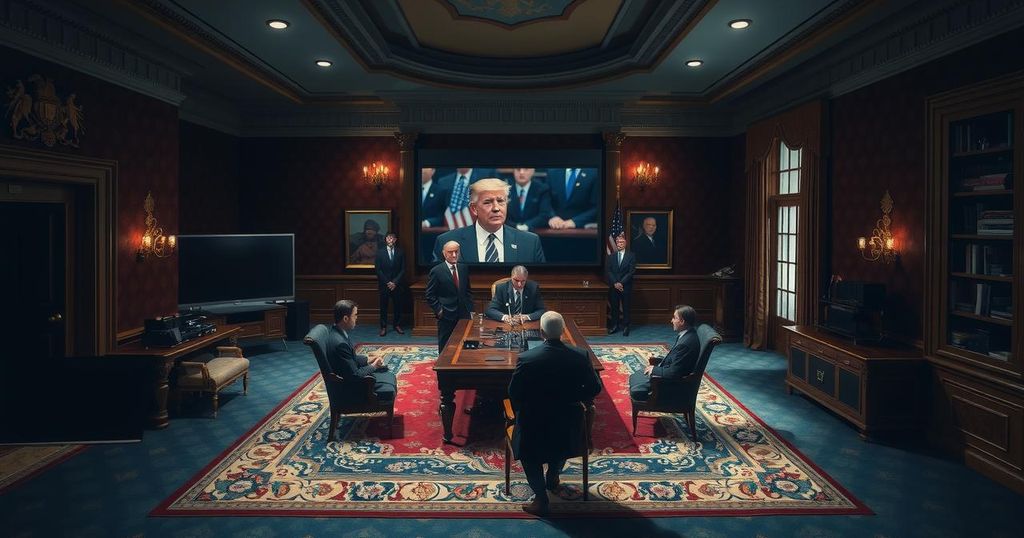Trump’s Oval Office Encounter with South Africa’s Ramaphosa: A Diplomatic Drama Unfolds

President Donald Trump’s meeting with South African President Cyril Ramaphosa in the Oval Office showcased a blend of confrontation and theatrical diplomacy. Trump presented controversial claims regarding white farmers in South Africa, using video footage and high emotions while Ramaphosa tried to remain composed. The presence of prominent golfers aimed to soften tensions, revealing strategies in international relations under Trump.
In a dramatic turn of events, during a meeting in the Oval Office between President Donald Trump and South African President Cyril Ramaphosa, foreign dignitaries were once again reminded of the potential for at-times confrontational encounters with the U.S. president. The meeting, held three months into Trump’s second term, exemplified the blend of political theater and serious diplomacy prevalent in his interactions with international leaders.
The scene escalated when a journalist asked President Trump about the controversial claims of “white genocide” in South Africa. In response, Ramaphosa urged the president to “listen to the voices of South Africans” before the meeting took a surprising turn. Trump, asking an aide to “turn the lights down,” proceeded to present a video that purported to display the persecution of white South Africans, emboldened by allegations he has highlighted before.
Curiously, billionaire Elon Musk, known for his ties to South Africa, observed quietly from his seat during the confrontation. This event stirred echoes of Trump’s similarly aggressive treatment of Ukraine’s President Volodymyr Zelensky earlier in the year. The video shown featured inflammatory content, including footage of South African political figures chanting phrases that stirred controversy and fear regarding the treatment of white farmers; however, the political figures shown do not govern, which raised questions about the validity of Trump’s assertions.
Amidst the escalating chaos, Ramaphosa attempted to delineate his stance, emphasizing that while he did sign a contentious land bill earlier, the law’s implementation remained unexecuted. Moreover, he distanced himself from the extreme rhetoric portrayed in the video. However, Ramaphosa entered the negotiations well-prepared, conscious of Trump’s penchant for theatrics in diplomacy.
Adding an unexpected twist, Ramaphosa brought along esteemed golfers Ernie Els and Retief Goosen, which seemed to be a strategic move to soften the atmosphere. This decision, while peculiar in the context of discussions about trade and agricultural policy, demonstrated the South African president’s desire to mitigate possible tensions during the meeting, although it was not typical of diplomatic engagements. Trump’s evident enjoyment of the golfers’ presence shone through, perhaps overshadowing Ramaphosa’s contributions.
Throughout the meeting, Trump continually harped on the struggles faced by South African farmers, expressing his willingness to welcome them as refugees to the U.S. Ramaphosa remained mostly unfazed, countering Trump’s provocations with calmness. At one juncture, referring to the presence of the golfers, he quipped that if there truly were a genocide against Afrikaner farmers, they would not be sharing his table.
Ultimately, Trump’s approach, characterized by a performative style of engagement, serves not only his objectives on the global stage but also resonates strongly with his domestic audience, keeping grievances alive in the public discourse. As foreign leaders adapt to these interactions, it seems that Trump may need to slightly adapt his diplomatic playbook to maintain an effective impact.
In summary, President Donald Trump’s recent meeting with South African leader Cyril Ramaphosa illustrated the unpredictable nature of diplomacy under his administration. This encounter highlighted not only Trump’s willingness to confront foreign leaders publicly but also the strategies adopted by those leaders, such as Ramaphosa’s use of notable figures like golfers, to navigate complex discussions. The performative aspect of these meetings underscores an approach that resonates with Trump’s domestic supporters, even as international relations evolve.
Original Source: www.bbc.com







